| Vintage Pulp | Apr 4 2020 |

Player, hustler, dealer, pimp.
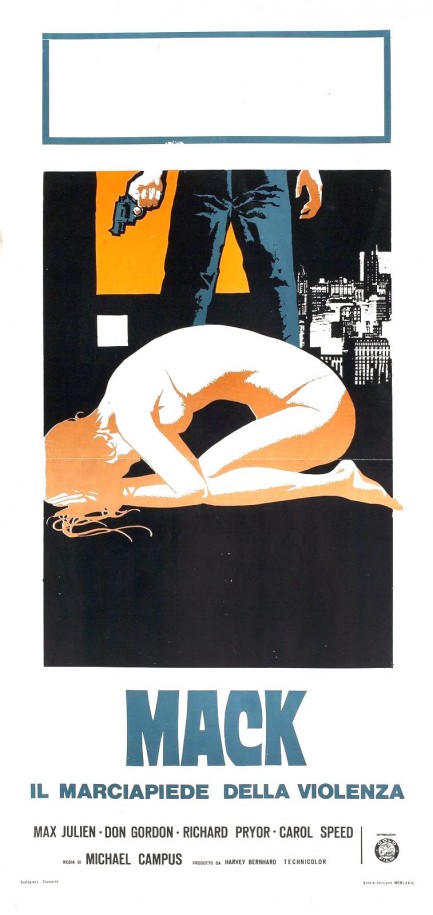
Here's a little something for the blaxploitation bin, an Italian locandina, or playbill, for the 1973 gangster classic The Mack, starring Max Julien, Richard Pryor, and Carol Speed. In Italy it was called Mack - Il marciapiede della violenza, aka, “Mack – sidewalk of violence,” and if anyone saw it based on this poster they must have been surprised by the African American cast. We don't have an Italian release date for the movie, but it opened in the U.S. today in 1973. From our non-professional perspective it's a pretty important flick. You can see what we wrote about it here.
| Vintage Pulp | Jul 16 2018 |

Neglected baseball comedy reminds viewers that the American pastime was also the African American pastime.
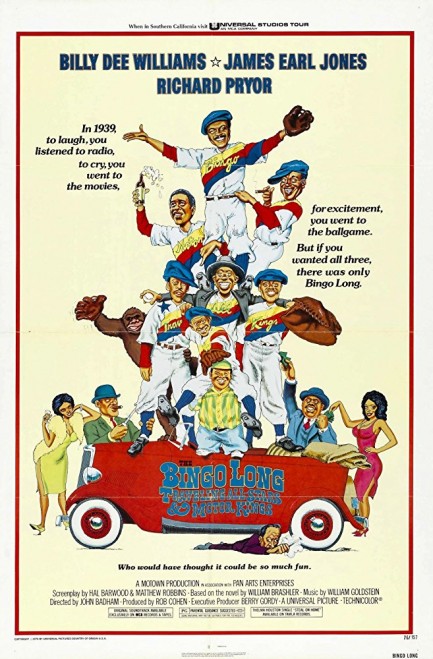
Major League Baseball is known as America's pastime. But for decades it was really only the pastime for whites, due to the fact that black participation was banned by every team, and black spectatorship was limited by apartheid laws. But during that time African Americans formed their own leagues, and those teams and players are part of wider baseball lore. As far as we know The Bingo Long Traveling All-Stars and Motor Kings, which is set in 1939, is the only major movie about black baseballers during the pre-integration era. That alone makes it worth a gander. James Earl Jones, Richard Pryor and Billy Dee Williams in the starring roles are bonuses. The plot involves various Negro League athletes who band together and barnstorm around the U.S. They're trying to get out from under bad contracts with their original teams, or bad jobs in mundane professions, but of course this break toward freedom leads to trouble.
The film benefits from excellent exterior location work. Director John Badham makes use of the old sharecropper cabins, winding rural roads, and rickety wooden stadiums of the American countryside. These would have existed in abundance when the film was made in the mid-1970s, requiring little in the way of set design. The authenticity is palpable. In other areas the film misses the mark, particularly in the tone of the performances, which are Vaudevillian and over-vernacularized. But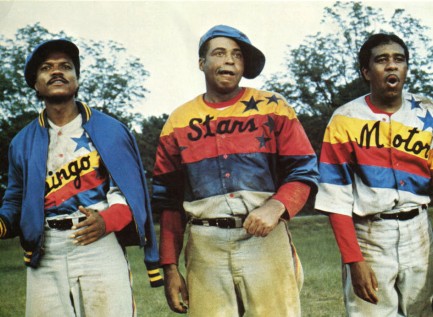 one aspect of the film hits a bullseye. James Earl Jones expresses it succinctly when he hears that the Major Leagues are scouting black players: “So the white man is finally moving in,” he says, as if speaking about the mafia. He goes on to predict the death of Negro League Baseball. Jones's point is crystalline: the Major Leagues broke the color line not out of altruism or justice, but in order to protect its product.
one aspect of the film hits a bullseye. James Earl Jones expresses it succinctly when he hears that the Major Leagues are scouting black players: “So the white man is finally moving in,” he says, as if speaking about the mafia. He goes on to predict the death of Negro League Baseball. Jones's point is crystalline: the Major Leagues broke the color line not out of altruism or justice, but in order to protect its product.
 one aspect of the film hits a bullseye. James Earl Jones expresses it succinctly when he hears that the Major Leagues are scouting black players: “So the white man is finally moving in,” he says, as if speaking about the mafia. He goes on to predict the death of Negro League Baseball. Jones's point is crystalline: the Major Leagues broke the color line not out of altruism or justice, but in order to protect its product.
one aspect of the film hits a bullseye. James Earl Jones expresses it succinctly when he hears that the Major Leagues are scouting black players: “So the white man is finally moving in,” he says, as if speaking about the mafia. He goes on to predict the death of Negro League Baseball. Jones's point is crystalline: the Major Leagues broke the color line not out of altruism or justice, but in order to protect its product. The oldest Negro League team had been around since 1885. By the 1940s Negro League players had competed against white players and proved to be capable, and in some instances, superior. MLB had a legitimacy problem. It couldn't truly claim to contain all the best baseball players. People were growing more interested in black baseball. Money was being made on the sport beyond the confines of MLB. A lot of money. Breaking the color line cemented the legitimacy of MLB's talent claims, and it obliterated competition from Negro League baseball, which died on the vine. Today black ownership in Major League Baseball is basically 0%. Only the Miami Marlins, with Derek Jeter possessing 4% of the club, can claim—and just barely—to have minority ownership. But a merger of Negro teams into the league rather than a raid of players might well have led to a different story. MLB integrated the field, but ensured future segregation of the owner's box.
Though the color line for players was broken all the way back in 1947, today MLB has another legitimacy problem. Black participation has declined over the decades. Organized baseball requires fields, equipment, sponsorship, and other elements that are scarce in poor communities. Of course, they've always been scarce, but as public money dries up and individual wages stagnate, community support for baseball and family income allowing for participation in it are lacking. African American rostering on Major League Baseball squads is at 1956 levels. Many consider that a travesty; but America being America, many don't. MLB's front office just lately has made some minimal efforts to address the problem. It will be interesting to see how those go. The Bingo Long Traveling All-Stars and Motor Kings premiered in the U.S. today in 1976.
Though the color line for players was broken all the way back in 1947, today MLB has another legitimacy problem. Black participation has declined over the decades. Organized baseball requires fields, equipment, sponsorship, and other elements that are scarce in poor communities. Of course, they've always been scarce, but as public money dries up and individual wages stagnate, community support for baseball and family income allowing for participation in it are lacking. African American rostering on Major League Baseball squads is at 1956 levels. Many consider that a travesty; but America being America, many don't. MLB's front office just lately has made some minimal efforts to address the problem. It will be interesting to see how those go. The Bingo Long Traveling All-Stars and Motor Kings premiered in the U.S. today in 1976.
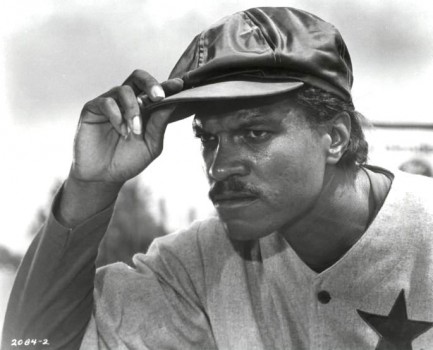
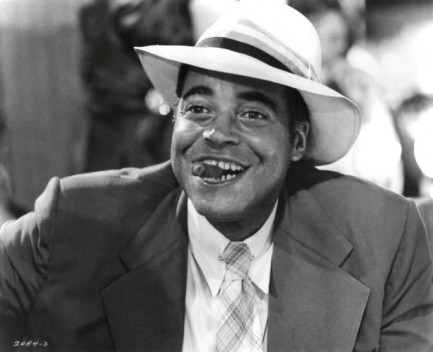
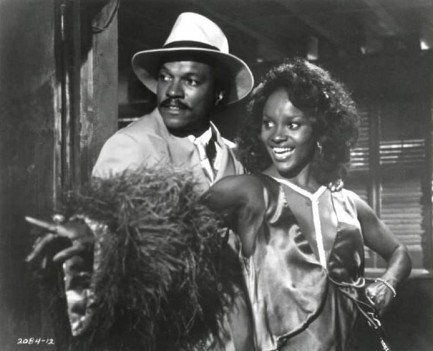
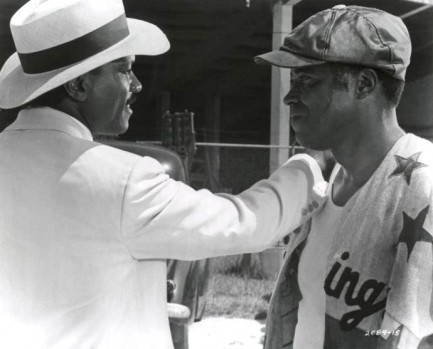
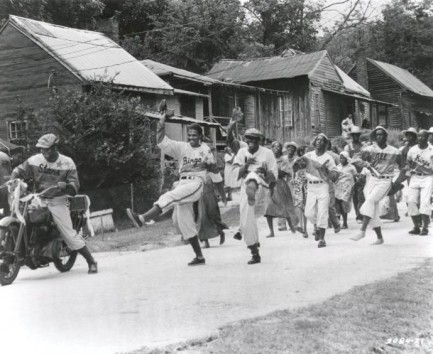
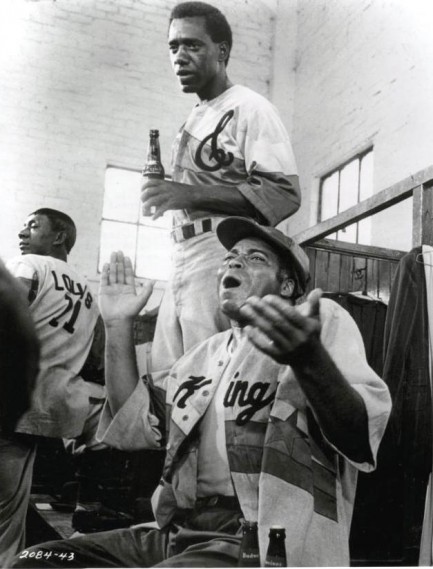
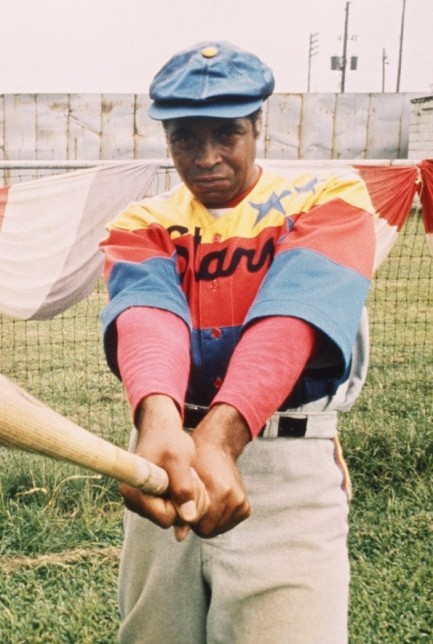
| Vintage Pulp | Apr 4 2017 |

It's hard out there for a pimp.
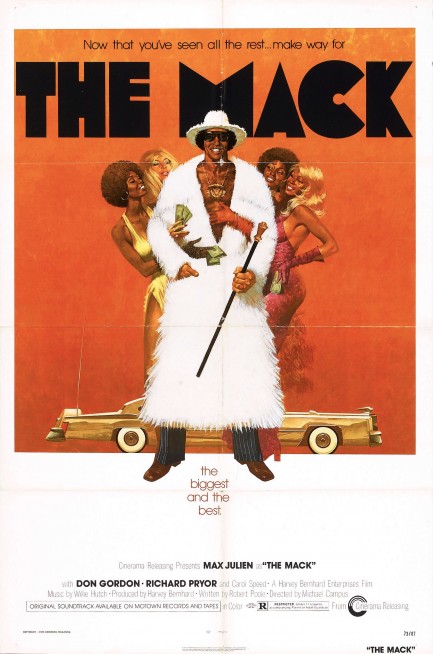
The Mack is about pimping. Let's just get that out there. Those with twenty-first century sensibilities will probably hate the film on principle. But is there anything more to it than sexual exploitation? Well, it's an offering in the blaxploitation genre that deals with an ex-con's plan to rise to the top of the macking game in the city of Oakland. The main character, named Goldie, has a brother who intends to rid the streets of crime. Goldie's main antagonists are a pair of corrupt cops who see no difference between him and his brother. The subtext is interesting. Goldie and his brother represent opposite forms of direct engagement—one works to improve his environment while opposed by authorities who see political activism as a threat; the other works illegally to get ahead and get out while opposed by authorities charged with fighting crime.
The movie chooses as its backdrop one of the most activist cities in the U.S., with one of the most corrupt police forces. Both of these facts were true when The Mack was made and remain true today. For example, while Oakland police are tasked with preventing crime, they repeatedly and brazenly break the law, and have paid out more in civil damages than almost any police force in the nation. This dichotomy calls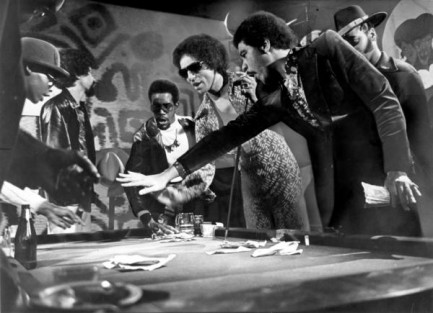
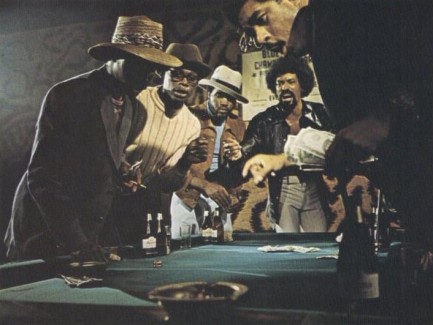
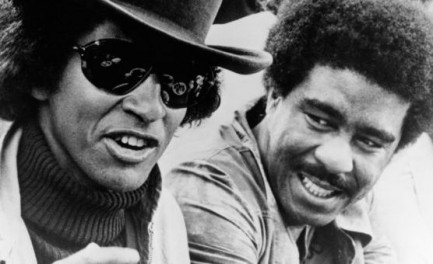 into question whether the police actually exist for the good of the community at all, or for a more complex purpose—say to protect the interests of elites by both containing crime and hemming in the possibility of political empowerment. Actually, the question is rhetorical. We've been to many countries, and in all of them police suppress political activity among the underclass. So yeah, there's more to The Mack than just pimping.
into question whether the police actually exist for the good of the community at all, or for a more complex purpose—say to protect the interests of elites by both containing crime and hemming in the possibility of political empowerment. Actually, the question is rhetorical. We've been to many countries, and in all of them police suppress political activity among the underclass. So yeah, there's more to The Mack than just pimping.


 into question whether the police actually exist for the good of the community at all, or for a more complex purpose—say to protect the interests of elites by both containing crime and hemming in the possibility of political empowerment. Actually, the question is rhetorical. We've been to many countries, and in all of them police suppress political activity among the underclass. So yeah, there's more to The Mack than just pimping.
into question whether the police actually exist for the good of the community at all, or for a more complex purpose—say to protect the interests of elites by both containing crime and hemming in the possibility of political empowerment. Actually, the question is rhetorical. We've been to many countries, and in all of them police suppress political activity among the underclass. So yeah, there's more to The Mack than just pimping.The movie was actually inspired by the real life struggle between the Ward Brothers, who were leaders of Oakland's black underworld, and the Black Panthers. Both groups wanted to bring Oakland under their respective control for opposite reasons. Film critic Elvis Mitchell described The Mack succinctly in 2013, saying: “Do you become this horrible kind of mutation of free enterprise, or do you take the nationalist route and help your people?” But the Oakland police ultimately considered power achieved through crime and power achieved through politics to be equally unacceptable. And that may be the entire disturbing point of the film. The Mack premiered in the U.S. today in 1973, and the awesome poster was painted by Fred Pfeiffer.
| Vintage Pulp | Jan 27 2017 |

Just being able to survive feels like success.
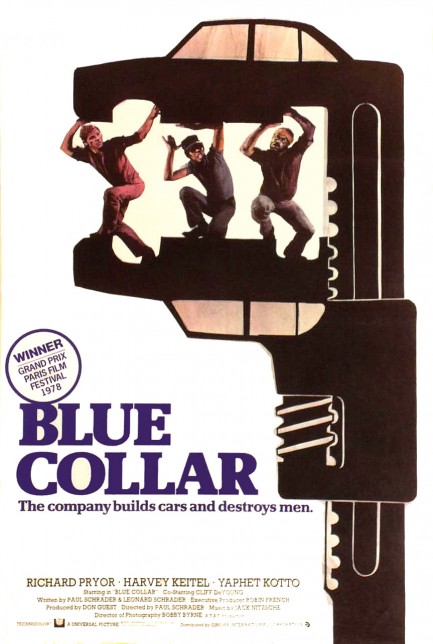
Tonight the Noir City Film Festival is screening the urban drama Blue Collar, possibly the best film on the ten-day slate. Richard Pryor, Harvey Keitel, and the underrated but indispensable Yaphet Kotto star, but this is Pryor's show, his star turn. A trio of Detroit auto workers are driven by financial desperation to rob their own union hall. They end up netting three-hundred dollars. Trouble is the union, seeking insurance money, claims it was twenty thousand. The organized crime guy who backed the job isn't interested in stories about a three hundred dollar take—he's owed ten percent and that's two grand. But there's hope—the robbery also netted a notebook filled with information on illegal loans, and if Pryor and company can sell it maybe they can come out on top after all. But just how likely do you suppose that is?
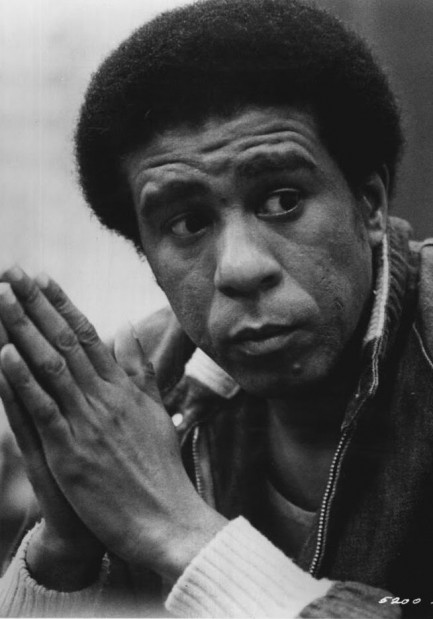 Blue Collar is a brilliant work of art. Cinematic maverick Paul Schrader directed it, operating in a gritty milieu that would become his trademark. But the pressurized lives of the working class heroes are truly brought to life by the cast. Keitel studied under Stella Adler and Lee Strasberg, as well as at the HB Studio, while Kotto is a guy who studied at the Actors Mobile Theater Studio and made his professional acting debut in Othello, but Pryor the stand-up comic outacted them both, using self-contained fury, razor sharp humor, and just the right amount of improvisation. The man was a once-in-lifetime talent. His comedy was fused with desperation and pain, but Hollywood tried to harness the funny Pryor and jettison the rest. It was like removing his heart. He truly shone only in serious films, where he would break high tension with moments of humanizing comedy. Blue Collar was the best of the lot.
Blue Collar is a brilliant work of art. Cinematic maverick Paul Schrader directed it, operating in a gritty milieu that would become his trademark. But the pressurized lives of the working class heroes are truly brought to life by the cast. Keitel studied under Stella Adler and Lee Strasberg, as well as at the HB Studio, while Kotto is a guy who studied at the Actors Mobile Theater Studio and made his professional acting debut in Othello, but Pryor the stand-up comic outacted them both, using self-contained fury, razor sharp humor, and just the right amount of improvisation. The man was a once-in-lifetime talent. His comedy was fused with desperation and pain, but Hollywood tried to harness the funny Pryor and jettison the rest. It was like removing his heart. He truly shone only in serious films, where he would break high tension with moments of humanizing comedy. Blue Collar was the best of the lot. By today's movie standards a couple of thousand dollars hardly seems like much to fret over. Audiences are used to crime films dealing with millions. But the small amounts here make the movie feel real. A 2016 study showed that half of adult Americans would not be able to come up with $400 in an emergency—they would have to sell something, borrow money, or not pay. Back in 1978, when Blue Collar was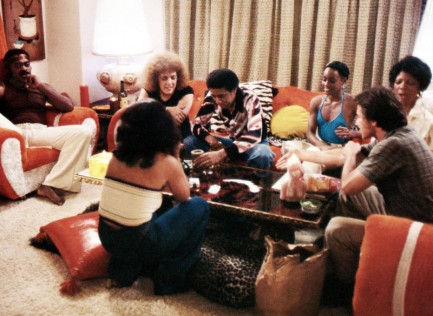
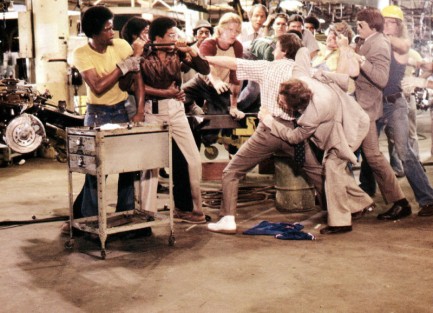 made, real wages in the U.S. were higher than they are now, so the movie depicts travails among working class people who were better off than working class people are today. Let that sink in. We think this is a perfect movie to show in San Francisco in 2017, a city overrun by tech workers contentedly pushing longtime residents out. The movie won't change anything in the city. But it will be remembered by the ticketholders at the screening.
made, real wages in the U.S. were higher than they are now, so the movie depicts travails among working class people who were better off than working class people are today. Let that sink in. We think this is a perfect movie to show in San Francisco in 2017, a city overrun by tech workers contentedly pushing longtime residents out. The movie won't change anything in the city. But it will be remembered by the ticketholders at the screening.

 made, real wages in the U.S. were higher than they are now, so the movie depicts travails among working class people who were better off than working class people are today. Let that sink in. We think this is a perfect movie to show in San Francisco in 2017, a city overrun by tech workers contentedly pushing longtime residents out. The movie won't change anything in the city. But it will be remembered by the ticketholders at the screening.
made, real wages in the U.S. were higher than they are now, so the movie depicts travails among working class people who were better off than working class people are today. Let that sink in. We think this is a perfect movie to show in San Francisco in 2017, a city overrun by tech workers contentedly pushing longtime residents out. The movie won't change anything in the city. But it will be remembered by the ticketholders at the screening.| Vintage Pulp | Jan 20 2011 |

Soul sister number 1.
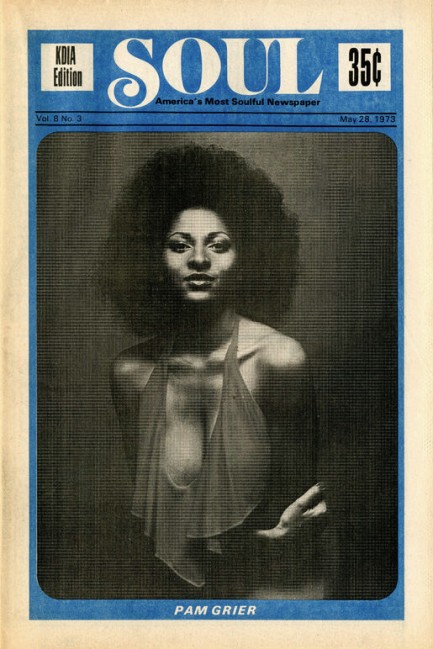
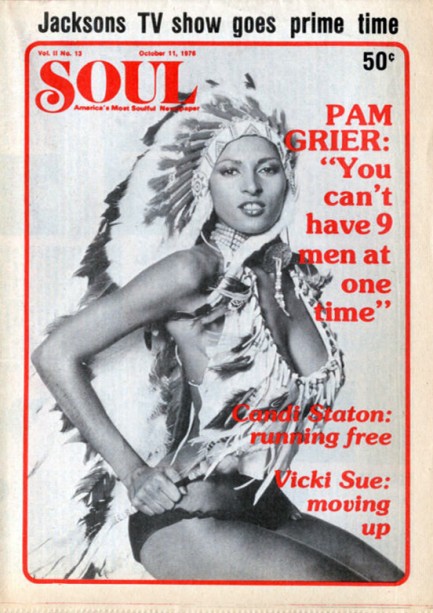
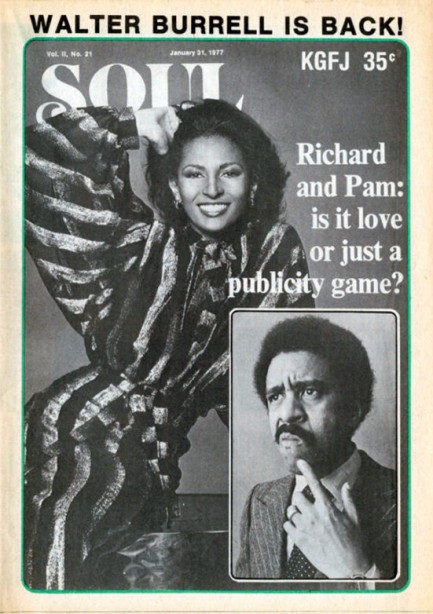
Above, three covers of Soul, with the immortal Pam Grier, along with an inset of her boyfriend Richard Pryor,1973, 1976 and 1977.




































































